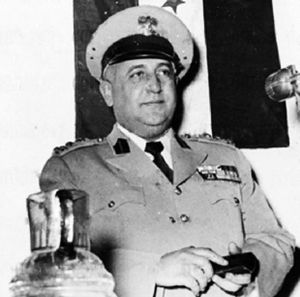Fawzi Selu
| Fawzi Selu فوزي السلو |
|
|---|---|
 |
|
| President of Syria (military Rule) | |
| In office December 3, 1951 – July 11, 1953 |
|
| Preceded by | Hashim al-Atassi |
| Succeeded by | Adib Shishakli (Military Rule) |
| Prime Minister of Syria | |
| In office December 3, 1951 – July 19, 1953 |
|
| Preceded by | Maaruf al-Dawalibi |
| Succeeded by | Adib Shishakli |
| Personal details | |
| Born | 1905 |
| Died | 1972 (aged 67) |
| Religion | Sunni Islam |
Fawzi Selu (1905–1972) (Arabic: فوزي السلو) was a Syrian military leader, politician and head of state (December 3, 1951–July 11, 1953).
Career
He studied at the Homs Military Academy and joined the French-sponsored Troupe Speciales that was created when France imposed its League of Nations mandate on Syria in July 1920. He had a successful military career, and when Syria became fully independent in 1946, he became the director of the academy. He was given a command in the 1948 Arab-Israeli War where he became close to chief of staff Husni al-Za'im. When Za'im came to power in a coup in March 1949, he appointed Selu military attaché to the Syrian-Israeli armistice talks, and he became the principal architect of the cease-fire that was signed in July of that year. Selu, supported by Za'im, demonstrated a willingness to pursue a comprehensive peace settlement with Israel, including a final border agreement, Palestinian refugees, and the establishment of a Syrian embassy in Tel Aviv. However Za'im was overthrown and killed, and civilian rule was restored with the administration of the nationalist Hashim al-Atassi. Atassi upheld the armistice agreement, but refused to consider peace with Israel. Selu then allied himself with military strongman general Adib al-Shishakli, who contrived to have Selu appointed minister of defense in three cabinets under president Atassi. Shishakli finally launched a coup in November 1951, but could not persuade the popular Atassi to stay on as president, who resigned in protest. As a result, Shishakli appointed Selu as president, prime minister and chief of staff, while retaining real power for himself with the less public role of deputy chief of staff. The two men ran a police state and suppressed virtually all opposition. Under the direction of Shishakli, Selu improved relations with Jordan, opening the first Syrian embassy in Amman and befriending King Talal. He also sought better relations with Lebanon, Egypt and Saudi Arabia.
On July 11, 1953 Shishakli finally dispensed with Selu and appointed himself as president. Selu fled to Saudi Arabi and became an advisor to King Saud and then his brother King Faisal. When Shishakli was overthrown in February 1954, a military court in Damascus charged Selu with corruption, misuse of office, and unlawful amendment of the constitution. He was sentenced to death in absentia.
References
- Sami Moubayed "Steel & Silk: Men and Women Who Shaped Syria 1900-2000" (Cune Press, Seattle, 2005).
| Preceded by | President of Syria 1951–1953 (military rule) |
Succeeded by Adib al-Shishakli (military rule) |
- Articles containing Arabic-language text
- Pages with broken file links
- 1905 births
- 1972 deaths
- Presidents of Syria
- Prime Ministers of Syria
- Syrian ministers of defense
- History of Syria
- People sentenced to death in absentia
- Syrian exiles
- Chiefs of Staff of the Syrian Army
- Homs Military Academy alumni
- 20th-century Syrian people